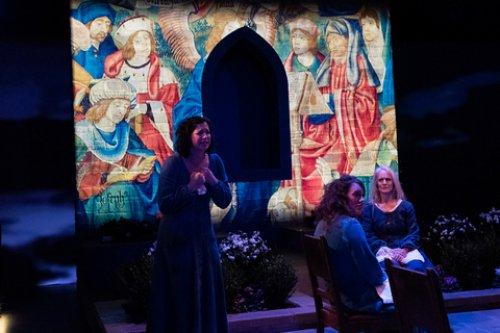The Convent
Compelling new play from the author of "Charles Ives Take Me Home" and "Row after Row" theatrically explores seven women on a retreat as they deal with the losses and disappointments in their lives.

Wendy vanden Heuvel and Brittany Anikka Liu in a scene from Jessica Dickey’s “The Convent” (Photo credit: Ahron R. Foster)
[avatar user=”Victor Gluck” size=”96″ align=”left”] Victor Gluck, Editor-in-Chief[/avatar]Raul Abrego’s magnificent setting puts the audience ringside in the world premiere of Jessica Dickey’s The Convent and what might have been an ordinary play about women and their problems today turns into an extraordinarily intimate and confessional evening making one feel almost like a voyeur. When one enters the theater, one is plunged into the 14th century with a stone courtyard bedecked by flower beds and walled in on two sides by luxurious fields of wheat (courtesy of Katherine Freer’s projection design.) In later scenes, projections of tapestries and stained glass windows turn the space into a dining hall, a chapel and the entrance to the sleeping quarters. There is no way to escape what happens here as the audience is no more than two rows away from the action, seated on opposite walls of the long sides of the venue.
The play takes place at a restored medieval French convent high up in the mountains where five women have come on a week’s retreat to get away from the world and attemp to deal with their losses and discontents, each with a different problem. Joining them is an uninvited guest, Patti (Samantha Soule), an interloper and one who has been there before and caused trouble each time. They are met by the self-proclaimed Mother Abbess (Wendy vanden Heuvel) who runs the establishment on the lines of a medieval convent: prayer, work, confession. However, taking into consideration contemporary times and needs, she has worked out a series of rituals, inspirational games, and a mild hallucinogen that puts you in touch with your personal demon. Once checked, in all dress in the blue medieval tunics designed by Tristan Raines.

Samantha Soule and Margaret Odette in a scene from Jessica Dickey’s “The Convent” (Photo credit: Ahron R. Foster)
Each woman is asked to pick a Nomen card of a female mystic of the Middle Ages such as Teresa of Avila, Clare of Assisi or Julian of Norwich who they will research and find out what she has to teach them. As we get to know the women, we discover that they are all there for different reasons: Jill, a Type A personality is escaping from her marriage; Tina is coping with the recent loss of her mother; Wilma, a nun, has lost her faith; (Cora) Dimlin is an heiress whose money has brought her no happiness, and Bertie, her younger companion who is seeking love. We eventually discover that Patti, the most outspoken and rebellious of them all, is seeking her mother but she may have come to the wrong place. And Mother Abbess, who appears to be unwell, is seeking forgiveness for the very personal choices she has made.
She gives advice from long experience that women cannot follow men if they are to become their own persons, but she is a good listener and questioner. The Convent has become her whole existence. Under her tutelage the women explore their wants and desires, their fears and losses, their sexuality and the things they have missed in their lives. Some of the women remain shadowy, others reveal a great deal. While none of this may be new, the intensity and vitality of the performances under Daniel Talbott’s direction and the fact that the audience is practically sitting on stage makes this a very visceral and passionate experience.

Amy Berryman, Samantha Soule and Wendy vanden Heuvel in a scene from Jessica Dickey’s “The Convent” (Photo credit: Ahron R. Foster)
Talbott has directed the play so that it moves at a breathless pace, with one revelation after the other tumbling out in swift succession. In another role of high emotion following her work in Transfers, Barbecue, And I and Silence, to name a few, Soule gives a commanding performance as the angry rebel. Her Patti is a tortured soul putting everyone through her grief but seeing through other people like a beacon. Vanden Heuvel’s Mother Abbess is also dealing with her demons but in a much more low-key, internal way. As the leader of the convent, she exudes authority and the confidence of age and life experience.
Margaret Odette’s Jill is a sophisticated woman who has only recently realized what she does not want but does not yet know what she does. Tina (Brittany Anikka Liu) is the youngest in her twenties, the most lost and the most unformed – and the most comic. As Wilma, the nun who has lost her faith, Lisa Ramirez is reflective, serious and disciplined. Annabel Capper (Dimlin) and Amy Berryman (Bertie) remain a bit of an enigma. While older Dimlin is a mentor figure for Bertie, we are never really told enough about their past lives to understand them. Taken together, the seven women comprise a microcosm of the lives of women today.

Amy Berryman and Annabel Capper in a scene from Jessica Dickey’s “The Convent” (Photo credit: Ahron R. Foster)
While Jessica Dickey’s The Convent may not have any new answers and may cover familiar material, it does so with such vitality and theatricality, that it becomes a memorable experience. Under the direction of Daniel Talbott, the seven actresses led by Samantha Soule and Wendy vanden Heuvel are compelling and expressive. By the time the play is over, the audience has experienced much that the inmates of the retreat have gone through.
The Convent (through February 17, 2019)
Weathervane Productions & Rising Phoenix Repertory in association with Rattlestick Playwrights Theater
Mezzanine Theatre at A.R.T./New York Theatres, 502 W. 53rd Street, in Manhattan
For tickets, visit http://www.weathervanetheater.org
Running time: one hour and 40 minutes with no intermission






Leave a comment